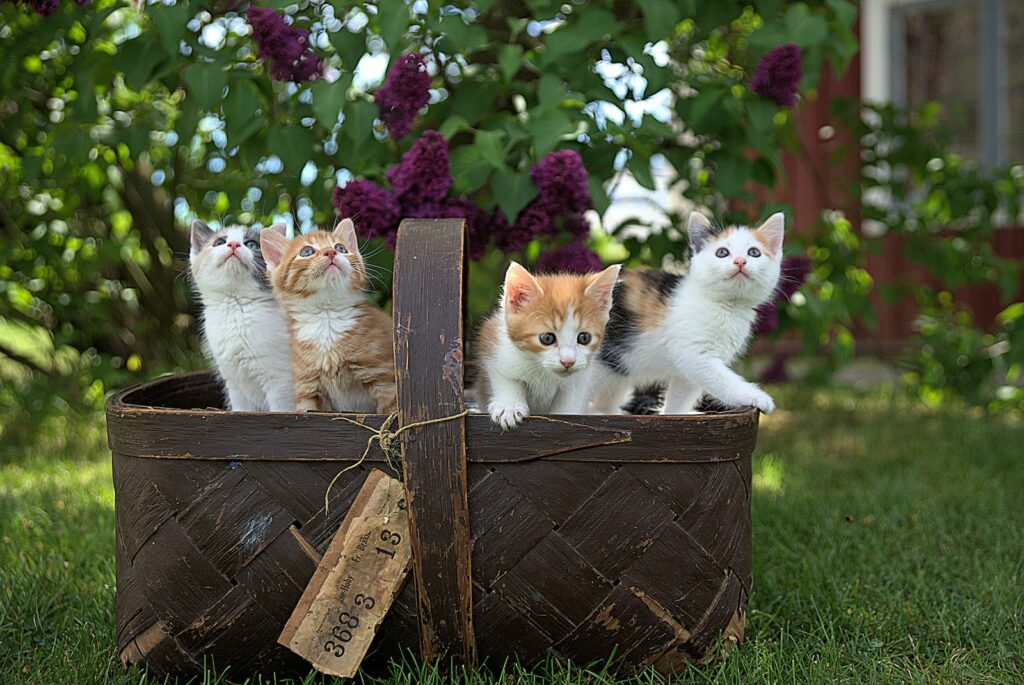Can Cats Eat Peanut Butter? — Yes, They can
When it comes to the question of whether cats can eat peanut butter, the answer is a resounding yes. While it may seem surprising to some, many cats enjoy the taste of peanut butter and can safely consume it in moderation. However, there are a few caveats to consider before treating your feline friend to this popular human snack.
Can Kittens Eat Peanut Butter?
Yes, kittens can eat peanut butter, but with caution. Due to their delicate digestive systems, it’s important to introduce new foods gradually to kittens. Peanut butter should only be given to kittens as an occasional treat and in small quantities. It’s always best to consult with a veterinarian before introducing any new food to your kitten’s diet.
Things to consider when feeding Peanut Butter to kittens?
When feeding peanut butter to kittens, it’s crucial to monitor their reaction. Some kittens may have allergies or sensitivities to peanuts. Watch for any signs of discomfort, such as vomiting, diarrhea, or excessive scratching. If your kitten exhibits any of these symptoms, discontinue feeding peanut butter immediately and consult a veterinarian.
Nutritional Benefits of Peanut Butter for Cats — Why Peanut Butter is good for Cats?
1. Source of Healthy Fats
Peanut butter contains healthy fats that can provide essential nutrients for cats. These fats contribute to a shiny coat and can support overall skin health. However, it’s important to note that peanut butter should be given in moderation to prevent excessive calorie intake.
2. Protein Boost
Peanut butter is also a good source of protein for cats. Protein is necessary for building and maintaining muscle mass. Including peanut butter as an occasional treat can help supplement your cat’s protein intake.
3. Enriched with Vitamins and Minerals
Peanut butter contains vitamins and minerals beneficial for cats, such as vitamin E, vitamin B6, niacin, and magnesium. These nutrients contribute to your cat’s overall health and well-being.
4. Mental Stimulation
Feeding your cat a small amount of peanut butter can provide mental stimulation and enrichment. The novelty and taste of peanut butter can engage your cat’s senses and provide a form of entertainment.
5. Medication Administration
In certain situations, peanut butter can be used as a vehicle for administering medication to cats. The sticky texture and appealing taste of peanut butter can help mask the taste of medication, making it easier to administer to a reluctant cat.
Potential Allergies: Can Cats Be Allergic to Peanut Butter?
While rare, some cats can be allergic to peanuts and, therefore, peanut butter. Peanut allergies in cats typically manifest as skin irritations, itching, and gastrointestinal issues. If you suspect that your cat is allergic to peanuts or peanut butter, it’s essential to avoid feeding them these foods and consult a veterinarian for further guidance.
Symptoms of Peanut Allergies in Cats
- Itchy Skin: Cats with peanut allergies may experience itchiness, redness, or hives on their skin.
- Gastrointestinal Issues: Digestive problems, such as vomiting or diarrhea, can occur in cats with peanut allergies.
- Respiratory Distress: In severe cases, cats may exhibit difficulty breathing or wheezing as a result of an allergic reaction to peanuts.
What to Do If Your Cat Shows Symptoms?
- Consult a Veterinarian: If your cat shows any symptoms of a peanut allergy, it’s crucial to seek professional advice. A veterinarian can properly diagnose the allergy and provide appropriate treatment options.
- Avoid Peanut Products: Keep all peanut products, including peanut butter, out of your cat’s reach to prevent accidental consumption.
- Consider Allergy Testing: In severe cases or for cats with a history of severe allergies, your veterinarian may recommend allergy testing to identify specific triggers and develop a comprehensive treatment plan.
Recommended Amount: How Much Peanut Butter Can a Cat Consume?
While cats can safely consume peanut butter, moderation is key. It should only be given as an occasional treat and in small quantities. As a general guideline, a small teaspoon of peanut butter once or twice a week can be a suitable serving size for an average-sized cat. However, it’s crucial to consider your cat’s overall diet and consult a veterinarian for specific recommendations based on their individual needs.
Things to Consider When Feeding Peanut Butter to Cats
When feeding your cat peanut butter, be mindful of the following considerations:
- Stick to natural peanut butter without added sugar, salt, or artificial sweeteners.
- Avoid peanut butter varieties that contain xylitol, as this sweetener is toxic to cats.
- Introduce peanut butter gradually to monitor your cat’s reaction and prevent any digestive issues.
- Remember that peanut butter should only be a small part of your cat’s balanced diet and should not replace their regular cat food.
How to Feed Peanut Butter to Cats: A Quick Guide
If you decide to treat your cat to some peanut butter, here are a few quick and easy ideas:
Peanut Butter Paw Lick:
Spread a small amount of peanut butter on a clean plate or your cat’s paw. Let them enjoy licking it off as a fun and interactive treat.
Peanut Butter Stuffed Toy:
Stuff a cat-friendly toy with a small amount of peanut butter and let your cat lick and play with it. This can provide mental stimulation and entertainment.
Peanut Butter Frozen Delight:
Mix a small amount of peanut butter with water and freeze it in an ice cube tray. Serve your cat a frozen peanut butter cube as a refreshing and delicious treat during hot summer days.
Conclusion
In conclusion, cats can indeed eat peanut butter as an occasional treat. It offers nutritional benefits, mental stimulation, and can be used as a tool for administering medication. However, it’s crucial to feed peanut butter in moderation, monitor for any potential allergies, and choose natural varieties without harmful additives. As with any new food, consult with your veterinarian to ensure it fits into your cat’s overall diet and health plan.






